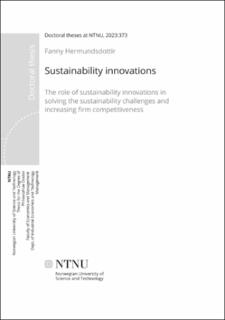Sustainability innovations: The role of sustainability innovations in solving the sustainability challenges and increasing firm competitiveness
Doctoral thesis
Permanent lenke
https://hdl.handle.net/11250/3103654Utgivelsesdato
2023Metadata
Vis full innførselSamlinger
Sammendrag
English summary
This dissertation seeks to explore how the implementation of sustainability innovations in firms can help us overcome the sustainability challenges and simultaneously increase firm competitiveness. This kind of research is important as the sustainability challenges are many, and firms are increasingly being pressured to help solving the environmental and social issues we are facing. In addition, businesses are faced with increased competition and must continuously improve in order to survive. Hence, the overall research question of this thesis is:
How can businesses contribute to solving the sustainability challenges and simultaneously maintain their competitiveness?
In order to answer this research question, four papers are developed. Paper 1 is a literature review of 100 peer-reviewed empirical articles, where the relationship between sustainability innovations and competitiveness is studied. Paper 2 is a quantitative study of Norwegian manufacturing firms that investigates how sustainability strategies affect the implementation of environmental and social innovation, and environmental and social innovations’ effect on perceived and objective firm performance. Paper 3 is also a quantitative study of Norwegian manufacturing firms that explores how the external shock of COVID-19 affects the implementation of environmental innovations. Paper 4 is a qualitative case-study of Norwegian oil and gas firms that investigates the role of dynamic capabilities in developing sustainability innovations and going into new markets like the renewable energy sector.
The papers find high empirical evidence in that sustainability innovations lead to increased competitiveness through increased value creation and non-financial assets, reduced cost and/or reduced risk. Thus, the findings contribute to the ongoing debate on sustainability implementation in firms, and show that firms can both contribute to solving the sustainability challenges, while simultaneously increase their competitiveness. However, the relationship is not necessarily straightforward as there are many factors that can influence the relationship related to national-, market-, industry- and firm factors. Overall, the findings contribute with important contributions to both to theory, practitioners and policy. Norsk sammendrag
Formålet med denne avhandlingen er å undersøke hvordan implementering av bærekraftsinnovasjoner i bedrifter kan hjelpe oss med å løse bærekraftsutfordringene og samtidig øke bedriftens konkurranseevne. Denne typen forskning er viktig ettersom bærekraftsutfordringene er mange, og bedrifter i økende grad blir presset til å bidra til å løse de miljømessige og sosiale problemene vi står overfor. I tillegg opplever bedrifter økt konkurranse og må kontinuerlig forbedre seg for å overleve. Det overordnede forskningsspørsmålet i denne avhandlingen er derfor:
Hvordan kan virksomheter bidra til å løse bærekraftsutfordringene og samtidig opprettholde sin konkurransekraft?
For å svare på dette forskningsspørsmålet utvikles det fire artikler. Artikkel 1 er en litteraturgjennomgang av 100 fagfellevurderte empiriske artikler, der forholdet mellom bærekraftsinnovasjoner og konkurranseevne undersøkes. Artikkel 2 er en kvantitativ studie av norske industribedrifter som undersøker hvordan bærekraftsstrategier påvirker implementeringen av miljø- og sosial innovasjon, og miljø- og sosiale innovasjoners effekt på opplevd og objektiv konkurransekraft. Artikkel 3 er også en kvantitativ studie av norske industribedrifter som utforsker hvordan det eksterne sjokket av COVID-19 påvirker implementeringen av miljøinnovasjoner. Artikkel 4 er en kvalitativ case-studie av norske olje- og gassbedrifter som undersøker rollen til dynamiske kapabiliteter for å utvikle bærekraftsinnovasjoner og gå inn i nye markeder som den fornybar energisektoren.
Artiklene finner sterke empiriske bevis på at bærekraftsinnovasjoner fører til økt konkurranseevne gjennom økt verdiskaping og ikke-finansielle eiendeler, reduserte kostnader og/eller redusert risiko. Dermed bidrar funnene til den pågående debatten om bærekraftsimplementering i bedrifter, og viser at bedrifter både kan bidra til å løse bærekraftsutfordringene, samtidig som de øker sin konkurranseevne. Det er imidlertid mange faktorer som kompliserer dette forholdet knyttet til nasjonale-, markeds-, industri- og bedriftsfaktorer. Samlet sett bidrar funnene med viktige bidrag til både teori, praktikere og politikk.
Består av
Paper 1: Hermundsdottir, Fanny; Aspelund, Arild. Sustainability innovations and firm competitiveness: A review. Journal of Cleaner Production 2020 ;Volum 280.(1) s. - © 2020 The Author(s). Published by Elsevier Ltd. This is an open access article under the CC BY license (http://creativecommons.org/licenses/by/4.0/).Paper 2: Hermundsdottir, Fanny; Aspelund, Arild. Competitive sustainable manufacturing - Sustainability strategies, environmental and social innovations, and their effects on firm performance. Journal of Cleaner Production 2022 ;Volum 370. s. - © 2022 The Authors. Published by Elsevier Ltd. This is an open access article under the CC BY license (http://creativecommons.org/licenses/by/4.0/).
Paper 3: Hermundsdottir, Fanny; Haneberg, Dag Håkon; Aspelund, Arild. Analyzing the impact of COVID-19 on environmental innovations in manufacturing firms. Technology in society 2022 ;Volum 68. s. - © 2022 The Authors. Published by Elsevier Ltd. This is an open access article under the CC BY license (http://creativecommons.org/licenses/by/4.0/).
Paper 4: Hermundsdottir, Fanny; Eide, Ann Elida; Bjørgum, Øyvind. Transition from fossil fuels to renewable energy: Identifying the necessary dynamic capabilities for a transition in the petroleum-based service and supply industry. This paper is under review for publication and is therefore not included.
